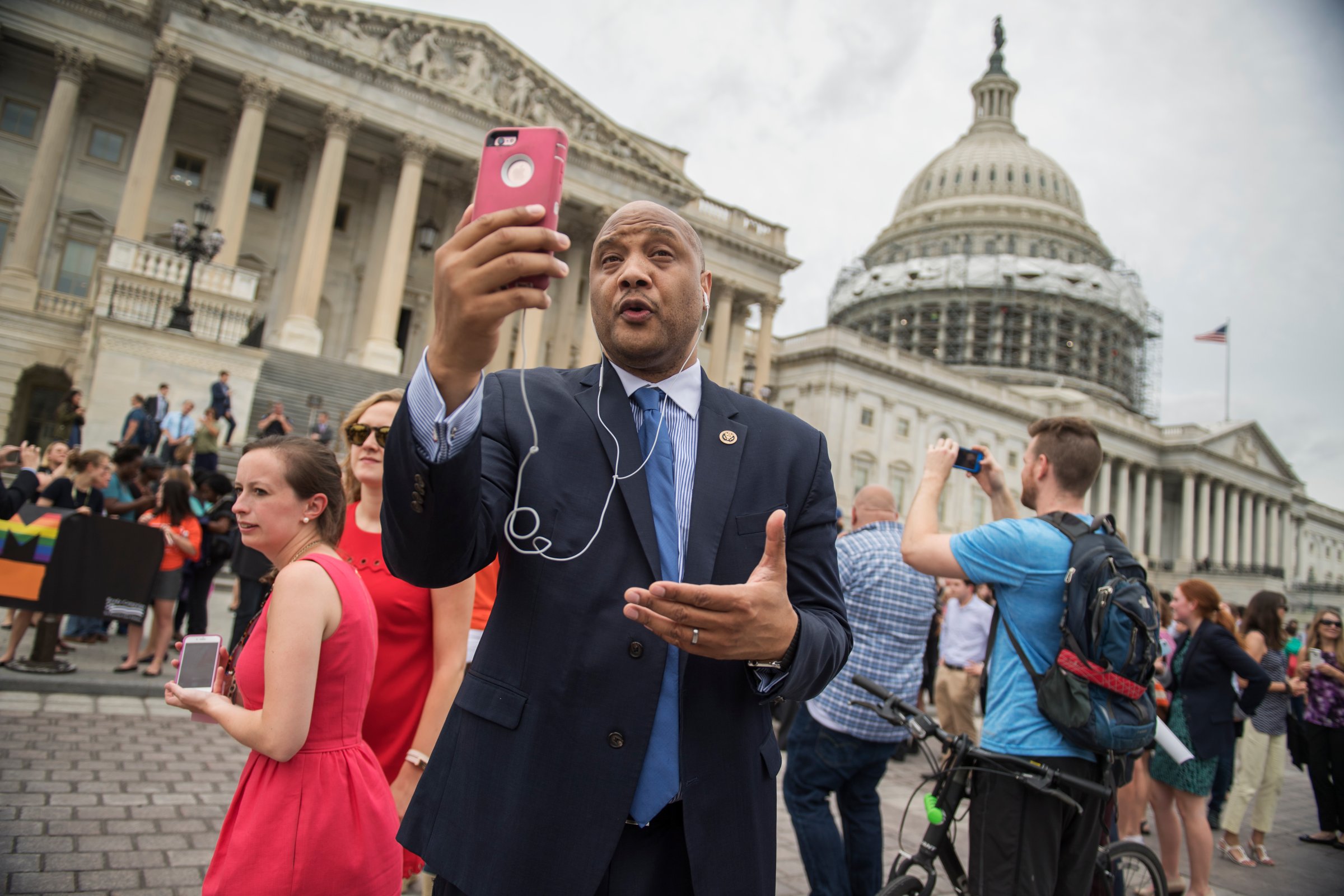
Eight years ago, after Democrats in the House chamber turned the lights off on a Republican minority seeking a vote on offshore drilling, C-SPAN—America’s official window into democracy at work—had no choice but to go dark.
On Wednesday, the channel was faced with a similar predicament, as Republicans adjourned and shut off the House cameras, while Democrats refused to leave without a vote on gun control bills. But this time, C-SPAN turned to a Congressman’s livestream on Periscope, which Twitter owns, surprising the nation by broadcasting the action directly from a House member’s smartphone.
In its short history, livestreaming as a political act has been largely confined to the streets. Defined by its subversive quality and gritty aesthetic, to livestream was to deploy a witness to those raw, pregnant moments when citizens challenged the power of the state—a protestor staring down police officers in Ferguson, a muckraker capturing a candidate on the campaign trail.
All of that changed in an instant. Livestreaming, long unwelcome in the corridors of power, entered new territory as Rep. John Lewis was Periscoped by a fellow member of Congress, leading a sit-in just a few feet from the Speaker’s Chair. C-SPAN, in making the editorial judgment to tap into Periscope feeds, elevated and legitimized the political act of livestreaming in even our most hallowed institutions. It was the sort of decision that spawns a new norm in our politics—having once defied the Republicans’ move to shut the cameras off, C-SPAN has shaped expectations of access for the future.
It was a claim to the floor of the House as the people’s floor. The decision recast our traditional boundaries of public spaces in our democracy—of what does and does not belong to us, of what we feel we are entitled to see as the messy art of democracy unfolds.
Will there be a moment of political contest that we do not now expect to be livestreamed, that we will not demand to witness? Malcolm Gladwell is right—the revolution won’t be tweeted. It will be Periscoped.
The other turning point prompted by #NoBillNoBreak is also one of political norms, albeit those of our politicians. Congressional Democrats, buried in campaign coverage and dreading a familiar reprisal of Republican obstruction on gun control, had been struggling to seize the public’s attention. The sit-in was most certainly a bid for publicity.
And in that regard, it was successful—it felt visceral and authentic on Periscope, a shocking instance of Congressmen searching for a way around their own powerlessness in the face of Republican intransigence. Even if no new gun control legislation was passed this week, Democrats were rewarded for their authenticity on social media, earning more than a million views on Twitter and with the press reframing an old debate over guns with a newfound urgency.
In contrast, most politicians’ use of Twitter, Facebook, and Snapchat tends to fall flat, implemented as afterthoughts on staid, scripted PR strategies that only confirm voters’ worst fears about how dull their elected officials can be. Many still conflate platform adoption with communications innovation—as if having interns repost your press release in bite-sized tweets or on Medium will do the trick.
This resistance to demonstrating authenticity on social media among our elected class is deeply ingrained, in part a byproduct of a creed that says that message discipline is the most important principle a politician can adhere to. Perhaps, but it bears its costs. Voters are increasingly disenchanted by a politics that they just don’t find to be very relevant anymore.
In truth, the actual practice of politics is a riveting drama, a tale of villains and heroes and dreams lifted and stifled. In a crowded media landscape, where the currency of attention has only inflated in value, politicians would be wise to harness social media to tell this story in ways that are worthy of our attention.
This doesn’t mean that candidates should livestream every second of their day, although some foolish ones will undoubtedly do so down the line. But the few politicians who have truly embraced Twitter as a platform, from Senator Cory Booker to New York City Councilman Brad Lander, have located its potential and established bonds with their constituents.
There will always be tradeoffs between message discipline and authenticity, but the political and media environment we live in today dictates that we favor the latter.
Perhaps, ultimately, authenticity can revive our democracy. If nothing else, #NoBillNoBreak may have finally taught Congress to grab the phones from the interns’ hands.
More Must-Reads From TIME
- The 100 Most Influential People of 2024
- Coco Gauff Is Playing for Herself Now
- Scenes From Pro-Palestinian Encampments Across U.S. Universities
- 6 Compliments That Land Every Time
- If You're Dating Right Now , You're Brave: Column
- The AI That Could Heal a Divided Internet
- Fallout Is a Brilliant Model for the Future of Video Game Adaptations
- Want Weekly Recs on What to Watch, Read, and More? Sign Up for Worth Your Time
Contact us at letters@time.com